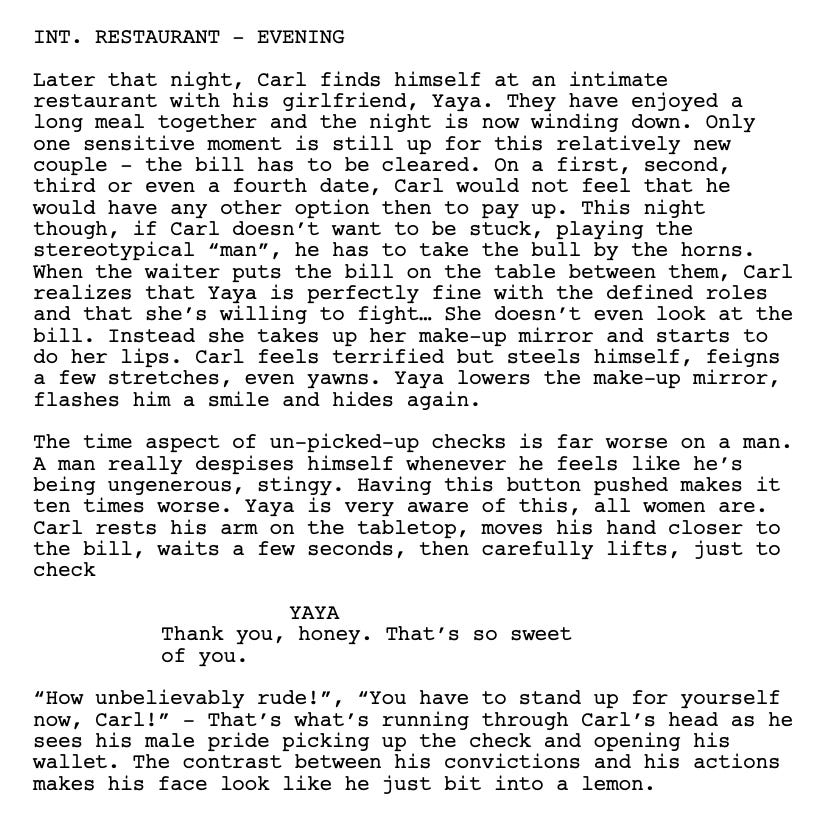Triangle of Sadness, directed by Ruben Östlund, won Cannes last year and is currently nominated for three Oscars, as well as a number of further awards. The screenplay for Triangle of Sadness, also written by Ruben Östlund, is available to read for free, and it’s a screenplay that has been nominated for an Oscar, too.
Around six years ago is when I first got curious about screenwriting specifically. I had written a lot before – always for fun – and I loved movies, so I was curious what it would be like to combine the two. What are the rules of screenwriting? How do you format? How do you structure? How do you do it all?
I set myself a challenge, I’d write a feature script, my first one ever, and I wouldn’t aim for it to be a masterpiece, but I’d aim for it to be as great as it can be, and written as ‘perfectly’ as a script can be written. I read a few books, but I realised that actually writing will teach me a lot more, so I went ahead and did that, and every time I had a question or didn’t know something, which was pretty much all the time, I would google, find the answer, and then adjust.
And when googling, I found there were specific ‘rules of screenwriting’, key things, rules that you should never ever break, and rules that ‘the greats only break because they are great’. I wrote four or five scripts following said rules, and some of them, including that first one, actually made it in the top 15% or top 10% of the Academy’s script competition, but it wasn’t until two-ish years ago I started understanding something super important – all those rules are bullshit.
They’re great to know. I urge everyone to learn ‘the right way of screenwriting’ first. And after that, understand, there’s no right way: there are only tips that might improve your script, but really your script should be written in a way so its story shines most, and that might be a way that breaks all screenwriting ‘rules’.
So, let’s look at just half a page of the Triangle of Sadness script, and I will count only some ‘rules’ this multi award-winning screenplay breaks:
Later that night – you’re not meant to say it’s later that night, you’re meant to present the information visually to the viewer; never write things you cannot see.
First time we meet YAYA, her name should be capitalised.
Intimate is not a word that practically describes a setting.
How do we know they’ve enjoyed a long meal? How is that information visually conveyed?
How do we know that they are a relatively new couple? How is THAT information visually conveyed?
How does Carl realise what Yaya is thinking? How is that information visually conveyed???
You’re not meant to describe the character’s inner feelings on the page, that’s the actor’s job.
All objects of key importance (MAKE UP MIRROR) should be capitalised.
The paragraph is way too long – space it out in three paragraphs.
There should be a ‘-’ or ‘:’ at the end of the paragraph, before Yaya speaks.
The author is speaking of male-female dynamics that are not relevant to the flow of the scene on the page.
I genuinely could go on and on. There are a lot more ‘mistakes’, and it’s not at all difficult for me to spot them, because of how much time I’ve spent looking for these ‘mistakes’ in my own writing. And the point is – all that criticism is bullshit, because the Triangle of Sadness script is incredible, and the way it’s written is unique, specific, and one of the key reasons why the film is as great as it is.
I also once read a statement by a script reader for one of those big screenplay competitions who said that nine out of the ten writers that went to the finals of the competition they were judging broke over three rules in the first page of their scripts. But they were the finalists! Yes, they were, because a great screenplay is not one that always splits paragraphs over five lines long, a great screenplay is a great outline for a great movie, and that apparently comes in all shapes and sizes.
It is great to know all these things, and I implore everyone to first write a script that follows all ‘rules’. But after that, once you know what you’re doing, then do what you wanna do. Write scripts adjusted to the story: does it work to describe your character’s inner feelings or thoughts? Is it necessary? If yes: do it. It will make your script better, and that’s all that matters.
Also watch Triangle of Sadness, it’s awesome.




